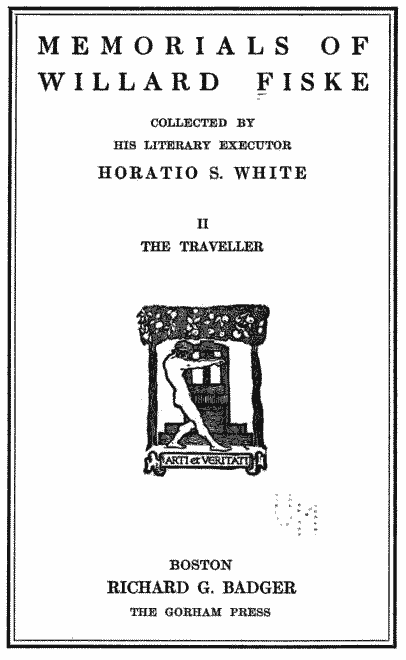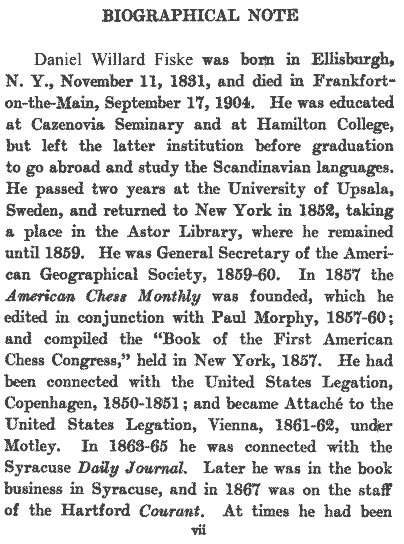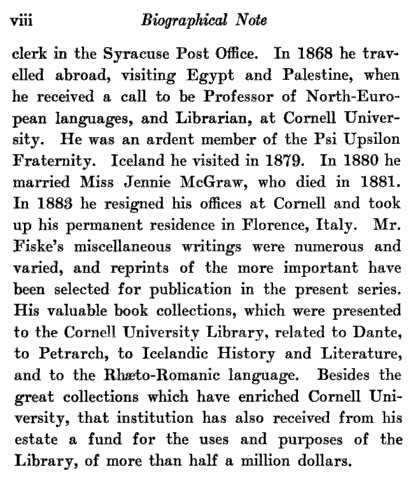|



Memorials of Willard Fiske
R. G. Badger, publisher on Google Book repository
Chess in Iceland and in Icelandic Literature: With Historical Notes on Other
Table-games
By
Willard Fiske from Google Book repository
from
Last Places: A
Journey in the North
by Lawrence Millman, (Houghton Mifflin Books, 2000)
|
The
other passengers included a day-tripping Danish birdwatcher, a
honeymooning couple from Reykjavik, and a Grimsey man named Willard.
Willard may not sound like an Icelandic name - it sits oddly on the tongue
after so many Sigurdurs, Gunnars, and Thorgeirs. It isn't an Icelandic
name. Bit it has been a rather common name on Grimsey ever since islanders
took to naming their offspring after an American gentleman of means named
Daniel Willard Fiske (1831-1904).
Willard Fiske was a traveler, a sports enthusiast,
linguist, diplomat, journalist and chess master. He wrote about Dante and
Cornell University's Psi Upsilon fraternity with equal facility. His
essays often took the road less traveled - one, for example, is entitled
"Syracuse as a Watering Hole." Another manages to find precursors of
baseball in the writings of Pliny and Homer, and probably contain the
first reference to the game as "the national sport of the United States."
One year he is lecturing against the spoils system in American public
office; the next year he has fixed his attention on the unhappy
fellaheen of Egypt. His crusades on behalf of the new Egyptian
alphabet ("One alphabet! One language! One country!) won him the accolade
of an old dahabieh owner on the Nile, who said: "After Mohammed -
Mr. Fiske!" In his leisure he composed chess problems.
As a student, Fiske had read the Sagas in their
original Icelandic and always thought of the country as an island of
rugged individualists rather like himself. In 1879 he decided to sponsor
the installation of a telegraph cable that would plug Iceland in to the
rest of the world. With a telegraph Icelanders would at least know when
and if their sovereign, the King of Denmark, died (when Frederick VII died
during the winter of 1863, no one in Iceland knew about it until the first
ship arrived on April 4, 1864). So Fiske sailed to Iceland to investigate
the prospects for laying the cable. Along the way his boat passed a
rough-hewn, uninviting little island at latitude 66o30'N,
directly on the Arctic Circle. That's Grimsey, a deckhand informed him,
and went to say it was the poorest, most miserable piece of land in the
country. Grimsey folk had the reputation of giving off an evil odor, the
result of an exclusive diet of seabirds and their eggs. Winters were so
cold that islanders refrained from sneezing for fear their noses would
break off and go rattling across the floor. If pneumonia didn't take them,
influenza would; once all the male islanders drowned in a storm and the
local minister was obliged to replenish the population through his own
carnal enterprise.
Fiske already knew a little about Grimsey from
his voluminous reading on chess. As Iceland itself had a passion for the
game, even greater was the passion of little Grimsey. According to legend,
the three-mile-long island had been settled by a clique of Viking
wayfarers who spent their days and nights playing chess. One of them had
the unfortunate ability to remember every move he'd ever made, until these
moves clogged up his mind to the exclusion of all else and he slipped off
in madness. Others took to their beds for weeks at a time in order to
perfect a certain line of attack or endgame combination. It was not
unusual for a man who lost a game through some ridiculous blunder to fling
himself off the cliffs in despair. On occasion, so went the rumor, Grimsey
folf still killed themselves over chess.
Poverty and chess! What better alliance for a man of
Willard Fiske's kidney? The telegraph didn't work out, so he turned his
attention to Grimsey. He was quite a beneficial man, about whom his good
friend Mark Twain once said, "He was a dear and sweet soul as I have ever
known." When he got back to the States, he sent marble chessboards and
chessman to each of the eleven farms on the island. Later he provided
Grimsey with firewood after the Gulf Stream no longer saw fit to supply
its shores with mahogany from Honduras and palm trees from Haiti. In 1901
he underwrote all costs for the island's first library. Upon his death his
will divided his considerable estate among Psi Upsilon fraternity, the
Cornell University library and this tiny outpost of the North.
Daniel Willard Fiske never once set foot on Grimsey. |
from
A History of Cornell
By
Morris Bishop
|
Daniel Willard Fiske was professor of north European languages, librarian,
and director of the University Press. Reared in Syracuse, he was a boyhood
friend of [Cornell president] White, and was the only Ithican privileged
to greet the President as "Andrew." (In his letters to Fiske, White
indulges in a special, playful humor, unwonted in his other
correspondence. He addresses Fiske with comic names, "lieber Fixius,
liebstes Fixlein, Fix Pasha, Mithter Fix.") Fiske entered Hamilton
College
in 1847, and was suspended in his sophomore year, for breaking into the
chapel and carrying off firewood. Somehow he conceived a romantic interest
in Icelandic and Norse literature. He went abroad after graduation and
studied at Copenhagen, supporting himself by writing letters to the
American press. He wintered at the University of Upsala in Sweden and
delivered a series of lectures on American writers. He returned to
America, and spent seven years as assistant librarian in the Astor Library
in New York, a year as Secretary of the American Geographical Society, and
another as Secretary to John Lothrop Motley, Minister to Austria. At the
same time his passionate devotion to chess led him to found the Chess
Monthly, to organize the first American chess congress (with
Paul Morphy as star), and collect the largest chess library in America. He
returned from Vienna to Syracuse, where he was editor of the Syracuse
Journal and was partner in a bookstore. He then joined the Hartford
Courant, edited by his college roommate, Charles Dudley Warner. While
reporting for the Courant the opening of the Suez Canal in 1868 he
received his appointment to Cornell.
His character appears in this bald vita. A rolling
stone who gathered considerable moss, he was readily captured by diverse
intellectual enthusiasms. His European experience gave him social polish
and a kind of malleability which made him at home, and warmly welcome,
from Iceland to Egypt. An excellent linguist, he was fitted for his
professorship of north European languages. Well trained in the best
American scholarly library, and a true bibliolater, he was equally well
equipped to establish Cornell's Library. A practical journalist, he could
supervise Cornell's publications and serve as an unofficial Director of
Public Information.
As professor, he gave instruction in German, Swedish,
and Icelandic and even offered a course in Persian. (I find no record that
anyone accepted the offer.) He reported the campus news for the
metropolitan press and contributed amply to the college papers. His most
important service, however, was the direction he gave the Library. In
those days a college library was likely to be a sorry accumulation, open
an hour or two a week for the withdrawal and return of wholesome reading
matter. (The first president of the University of North Carolina kept the
University Library in an upstairs bedroom of his house for twenty years.
The librarian of Columbia resolutely fought every effort of the faculty to
add a book, in order to turn back half his appropriation unused.) Fiske's
conception was totally different. He held that Cornell's collection should
be a reference library., like the Astor or the Bodleian, expanding the
studies of the faculty and stimulating the students' curiosities. His
effort was to obtain, by gift or purchase, fine scholarly collections
entire. The historical libraries of Goldwin Smith and Jared Sparks, the
classical library of Charles Anthon, the philological library of Franz
Bopp were thus secured, to Cornell's great and increasing benefit. From
the first, the Library was open nine hours a day - longer hours, boasted
Fiske, than in any other American university. (And today Cornell's
Library, open fifteen hours and forty minutes daily, makes the same
boast.)
Fiske, a bachelor, was a kindly friend to young men,
particularly the young men of the Psi Upsilon fraternity. White had to
intervene to prevent him from giving inordinate proportion of his small
salary to the new chapter and to needy brothers. Again, White was obliged
to reprimand him for offering a glass of ale to a student. Fiske retorted
that his hand was forced; he was enjoying his ale with a friend, as he did
once a fortnight, when the student entered, and he felt bound by the laws
of hospitality. Further, he was not going to change his personal habits
for any Board of Trustees. [Fiske to ADW,
4 Sept. 1869].
Tempora mutantur, nor et mutamur in illis.
Fiske was a nervous, volatile, irascible man. Abounding
in generosity, he could never forget or forgive a slight or an insult.
Since Vice-President Russel's gift of mockery matched his own, he detested
Russel, and Russel thoroughly mistrusted Fiske. Especially when spurred by
passion, Fiske could write brilliantly, with a verbal felicity that Andrew
D. White himself could not equal. (Yet his only two actual books bear the
strange titles of Chess in Iceland and An Egyptian Alphabet for
the Egyptian People.)
. . . .
|
archives
|

